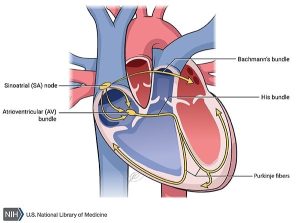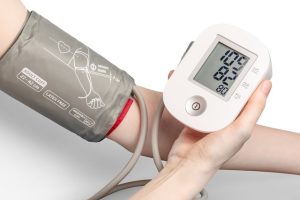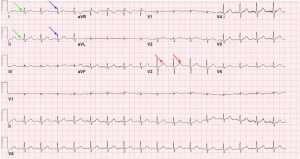
The thyroid gland produces the hormones T4, and to a lesser extent, T3. These hormones, particularly T3, the active form, act on nearly every organ in the body. An organ’s function becomes affected when the level of thyroid hormone is too high (hyperthyroidism) or too low (hypothyroidism). How does a high thyroid level affect the heart?
Cardiac effects of hyperthyroidism include faster heart rate, stronger squeezing of the heart, increased blood pressure, and irregular electrical activity of the heart.
Let’s discuss these 4 important cardiac effects of hyperthyroidism, the symptoms someone may feel, and the dangerous consequences to the heart of not treating hyperthyroidism.
1. Fast Heart Rate (Tachycardia)
Heart rate refers to the number of times the heart beats per minute. As we know, heart rate varies whether we are resting or active. A normal resting heart rate ranges from 60 to 100 beats per minute. Conditioned athletes may have a normal resting heart below 60 beats per minute.
Are you wondering what your resting heart is? You can check your pulse on the wrist right now with these instructions. Gently press your index and middle fingers of one hand on the opposite wrist. Count the number of beats in 30 seconds and multiply by 2. Or, you can count the number of beats in 60 seconds.

Pro-tip for feeling the pulse at your wrist: Turn your hand/wrist face down so your pulse is resting on your index and middle fingers.
Hyperthyroidism stimulates the heart’s pacemaker (sinoatrial node), increasing the intrinsic rate of the heart.

Image Source: MedlinePlus, National Library of Medicine
A person with hyperthyroidism may have a resting heart rate >90-100 beats per minute, referred to as tachycardia. Exercise can exaggerate this increase in heart rate.
2. Stronger Squeezing of the Heart
The heart is a muscle that squeezes in a coordinated fashion to move blood through its 4 chambers and out to the rest of the body. See this video by the American Heart Association for an animated example.
The increased levels of thyroid hormone signal the heart muscle to make more proteins that help its squeezing action. The heart squeezes with more strength and pumps out more blood with each beat.
3. Increased Blood Pressure (Hypertension)
To understand the effect of hyperthyroidism on blood pressure, let’s review the 2 numbers in a blood pressure reading. An example of a blood pressure reading is 120/80 mmHg, said as “120 over 80 millimeters of mercury.” The top number is referred to as “systolic” and the bottom “diastolic.” Millimeters of mercury is the unit of measurement. The systolic number estimates the pressure in your blood vessels when the heart beats. The diastolic number estimates the pressure in your blood vessels when the heart is resting between beats.

We described above how increased thyroid hormone makes the heart squeeze stronger and pump out more blood. With a stronger squeeze and more blood pumped out per beat, the systolic pressure increases. This explains why in hyperthyroidism we see systolic hypertension or an elevated top number. Changes to the diastolic pressure are more complex. Generally, the diastolic pressure decreases. This creates a bigger difference between the systolic and diastolic pressures (known as widened pulse pressure).
4. Irregular Electrical Activity
The heart has a built-in electrical system that coordinates how and when it squeezes.
The SA node is often referred to as the heart’s pacemaker. At rest, it sends off an electrical impulse 60 to 100 times per minute (our definition of normal resting heart rate). This electrical impulse flows through the rest of the “wiring” you see in the above picture, leading to a coordinated squeeze.
Have you ever had an ECG or EKG of your heart? ECG stands for electrocardiogram. It is a graphical recording of the electric signal of your heart. The ECG shows how the electric signal travels through the heart muscle. It can give information such as the heart rate, size of the chambers, presence of damage to the muscle or electric system, and much more. This is an example of a normal ECG:

Breaking down and reading the components of an ECG is complex and outside of our discussion today. Let’s keep the general picture of this normal ECG in mind as we discuss the effects of hyperthyroidism on the electrical activity of the heart.
Just as increased thyroid hormone levels speed up the heart rate, they stimulate premature electrical activity in the heart. What do we mean by premature? There is an electrical impulse occurring before it should. Let’s look at one part of an ECG below, called the rhythm strip, that shows premature electrical activity.

The yellow arrows point to beats occurring early and irregularly.
It is important to note that irregular electrical activity can occur in people with hyperthyroidism with normal hearts. Someone with pre-existing heart disease may face an increased risk of developing an arrhythmia (abnormal heart rhythm).
What symptoms can these 4 effects cause?
Common symptoms include tachycardia and palpitations. Increased thyroid hormone causing a faster heart rate and stronger squeezing of the heart explain these common symptoms. Someone with hyperthyroidism may feel their heart beating faster and stronger, even at rest. Exercise or times of physical stress may exaggerate these symptoms.
Decreased exercise tolerance is another symptom. An increased level of thyroid hormone makes the heart work beyond its normal state by beating faster and squeezing stronger. When someone exercises and the body demands the heart to work harder, the heart has less capacity left before reaching its maximum limit. Someone may feel their exercise limit is less than their normal capability.
Cardiac consequences of untreated hyperthyroidism
We will discuss 2 potential, dangerous consequences to the heart of not treating hyperthyroidism: 1) atrial fibrillation 2) heart failure.
Atrial fibrillation is an abnormal, irregular heart rhythm, often causing a fast heart rate. The upper chambers of the heart are not squeezing in a coordinated fashion with the lower chambers. Atrial fibrillation appears like this on a rhythm strip:
![]()
Notice how the vertical spikes appear randomly.
The fast and erratic squeezing of the upper chambers of the heart in atrial fibrillation leads to blood not flowing properly from the upper chambers into the lower. Think of it as a stagnant pool of blood not emptying from the chamber. This pool of blood can form a blood clot. Now there is a risk for the clot to dislodge and travel to the brain, causing a stroke. This is why many patients with atrial fibrillation take blood-thinners. In addition to the risk of blood clots, atrial fibrillation can lead to our next dangerous consequence, heart failure.
Heart failure can result from untreated hyperthyroidism. Heart failure is a condition in which the heart cannot pump blood or fill with blood the way it should. It is often referred to as congestive heart failure because of fluid accumulation in the body. Symptoms include shortness of breath, swollen legs, and fatigue. Atrial fibrillation, and a long-standing fast heart rate because of hyperthyroidism, alter the heart’s ability to pump or fill properly.
Final Thoughts
Learning the 4 important cardiac effects of hyperthyroidism and the associated symptoms helps explain the need for prompt treatment and preventing dangerous consequences to the heart. Treating hyperthyroidism includes identifying the underlying cause, discussing the benefits and risks of the options, and developing a personalized plan with your endocrinologist.
Schedule an initial consultation to discuss how we can create a personalized plan for you. If you have comments or questions about hyperthyroidism, share them in the comments section.
Related Questions
How does hyperthyroidism affect the heart?
Cardiac effects of hyperthyroidism include faster heart rate, stronger squeezing of the heart, increased blood pressure, and irregular electrical activity of the heart.
Why does hyperthyroidism cause tachycardia?
Hyperthyroidism stimulates the heart’s pacemaker (sinoatrial node), increasing the intrinsic rate of the heart. A person with hyperthyroidism may have an increased resting heart rate.
What effect does thyroid hormone have on stroke volume?
Increased thyroid hormone (hyperthyroidism) can cause tachycardia, increased myocardial contractility, an increase in stroke volume, and consequently, an increase in ejection fraction.




